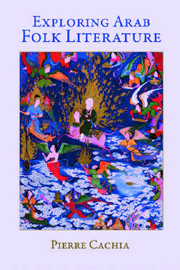Book contents
- Frontmatter
- Contents
- Acknowledgements
- Dedication
- Foreword by Professor Clive Holes
- Introduction
- The Transcription of Both Classical and Colloquial Arabic
- Part 1 Fact Finding
- Part 2 Single or Related Items
- Part 3 Cultural and Social Implications
- 14 Two Perspectives on the ‘Other’ in Arabic Literature
- 15 Maltese: Arabic Roots and Sundry Grafts
- 16 Social Values Reflected in Egyptian Popular Ballads Studies in Modern Arabic Literature, ed. R. C. Ostle (London, 1975)
- 17 Folk Themes in the Works of Najīb Surūr Arabic and Middle Eastern Literatures, 3, 2 (July 2000)
16 - Social Values Reflected in Egyptian Popular Ballads Studies in Modern Arabic Literature, ed. R. C. Ostle (London, 1975)
from Part 3 - Cultural and Social Implications
Published online by Cambridge University Press: 05 February 2015
- Frontmatter
- Contents
- Acknowledgements
- Dedication
- Foreword by Professor Clive Holes
- Introduction
- The Transcription of Both Classical and Colloquial Arabic
- Part 1 Fact Finding
- Part 2 Single or Related Items
- Part 3 Cultural and Social Implications
- 14 Two Perspectives on the ‘Other’ in Arabic Literature
- 15 Maltese: Arabic Roots and Sundry Grafts
- 16 Social Values Reflected in Egyptian Popular Ballads Studies in Modern Arabic Literature, ed. R. C. Ostle (London, 1975)
- 17 Folk Themes in the Works of Najīb Surūr Arabic and Middle Eastern Literatures, 3, 2 (July 2000)
Summary
My subject needs to be approached with much circumspection. The whole of Arabic popular literature has suffered not only from neglect, but also from contempt; and now that a handful of scholars have turned their attention to it, some significant issues are being obscured rather than clarified by premature theorising, in which selected facts are made to fit into a preformed frame of literary or social reference. Yet the more closely one looks at this literature with its great diversity and many ramifications, the more difficult it becomes to formulate its distinctive features or delimit its true territory.
In the hope of establishing a reasonably firm foothold, and because I am all too aware of my handicap in trying to study such a subject from a distance, I have limited myself severely to a comparatively small but easily definable genre within popular literature, namely, the narrative told entirely in song or verse, to the exclusion even of such epic cycles as the Hilālī stories that are partly in prose.
The evidence I have come across regarding the origination and transmission of the texts is far from clear-cut or uniform. For the art is indeed practised by men and women who conform with the conventional image of the wandering minstrel carrying songs part remembered and part improvised from one rural festival to another.
- Type
- Chapter
- Information
- Exploring Arab Folk Literature , pp. 191 - 202Publisher: Edinburgh University PressPrint publication year: 2011



